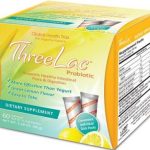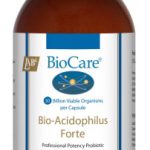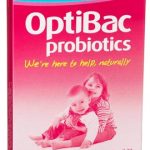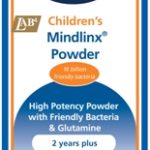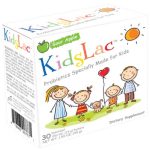It might be said that many things in life are about striking a balance and keeping them in harmony. In many ways, that’s true of your health too – not least your gut health. For, individually (and especially when they’re combined), the effect of toxins, a poor diet and stress on the digestive system is to seriously imbalance its order and cause you issues and problems. Fortunately, however, to combat these malignant forces in the gut, there are probiotics.
These micro-organisms are terrific at keeping the peace in the gut; restoring balance to it by driving out harmful toxins and other organisms that are such bad news. To be specific, a probiotic is either a type of living bacteria or yeast and healthy people carry around a great number of them within their bodies all the time. Neither harmful nor pathogenic, probiotics then enjoy symbiotic relationships with the human body (on the skin and in the mouth, nostrils and gut – the latter of which is home to more than 500 of them1). And, in terms of the gut, they play an absolutely critical role in creating the all-important microbiome there, featuring varied microbiota (or microflora), helping to ensure natural digestion, reliable immunity and good mental clarity.
Probiotic benefits
Going into more detail on just exactly why probiotics are so critical to the body then – and why they contribute so much to keeping it in balance and maintaining your good health – the following are all benefits delivered by probiotics when consumed either via foods rich in them or supplementary products:
- Improve response from the immune system2
- Reduce negative effects of taking antibiotics, such as diarrhoea3
- Reduce irritation experienced in the gut after surgery3
- Contribute to better-looking complexion and skin4
- Encourage easier food and drink digestion6
- Positively contribute to upper respiratory health7
- Ease symptoms of lactose intolerance8
- Aid better yeast balance in the gut and elsewhere in the body9
- Promote good vaginal health10
- Enable improved absorption of nutrients from consumed food and drink11
- Support natural, normal bowel movements12
- May improve oral health and help reduce halitosis (bad breath)13
- Aid the body in synthesising B vitamins (separating them from food and using them)14, absorbing calcium15 and producing Vitamin K16.
Probiotic foods
So, armed with the knowledge of all the good consuming probiotics can do for you, as you now are, you’ll be wondering what the best sources for them actually are. Well, you’d be highly advised to try and work into your diet the following as often as possible:
- Yoghurt – famed the world over as being a food that tends to be rich in probiotics (so long as it’s the right kind of yoghurt, of course), a healthy yoghurt takes some beating here; but, as nudged at, be careful, as too many yoghurts are sugar-rich so, instead, you ought to be aiming for those that contain almond, cashew, coconut or hemp ingredients17
- Kefir – like yoghurt, this is a cultured dairy drink (if you didn’t already know); in addition to being packed with probiotics, kefir also features Vitamins B12 and K, calcium, folate, magnesium, phosphorous and thiamine18
- Kimchi – the great thing is that kimchi, being a traditional Korean side dish comprising fermented vegetables, features a fantastic combo of cabbage, garlic, ginger, onion, radish and red pepper, thus making it a genuine superfood; this means that it’s not just bursting with probiotics and antioxidants, but also Vitamin C, the B vitamins, beta-carotene, calcium, dietary fibre, iron and potassium19.
Special offer probiotics
As mentioned above, it’s possible to boost your probiotic intake through naturally-derived, organic supplements as well, so should you find it difficult to work the likes of the above probiotic-rich foods into your diet, this may well be an appealing route to go. The following – all of them currently on special offer – are available (as are more) through us at The Finchley Clinic:
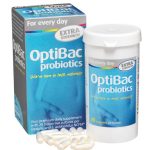 Optibac Probiotics for Every Day EXTRA Strength (90 capsules) – contains 20 billion live micro-organisms in each daily dose, including five probiotic strains, ensuring it supports overall digestive health, immunity and energy.
Optibac Probiotics for Every Day EXTRA Strength (90 capsules) – contains 20 billion live micro-organisms in each daily dose, including five probiotic strains, ensuring it supports overall digestive health, immunity and energy.
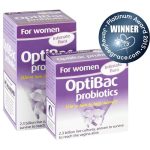 Optibac Probiotics for Women (90 capsules) – clinically trialled by over 2,500 women, this version of Optibac Probiotics contains the micro-organisms L. rhamnosus GR-1 and L. reuteri RC-14, which may help treat thrush, cystitis, and bacterial vaginosis; safe and appropriate for women experiencing menopause, as well as pregnant and breastfeeding mothers.
Optibac Probiotics for Women (90 capsules) – clinically trialled by over 2,500 women, this version of Optibac Probiotics contains the micro-organisms L. rhamnosus GR-1 and L. reuteri RC-14, which may help treat thrush, cystitis, and bacterial vaginosis; safe and appropriate for women experiencing menopause, as well as pregnant and breastfeeding mothers.
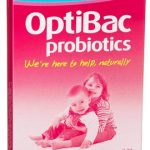 Optibac Probiotics for Babies & Children (90 sachets) – ideal for children and infants (specifically for their digestion and natural defences), as well as women during pregnancy; contains three probiotics that highly important for young children’s health: acidophilus, B. infantis and bifidum.
Optibac Probiotics for Babies & Children (90 sachets) – ideal for children and infants (specifically for their digestion and natural defences), as well as women during pregnancy; contains three probiotics that highly important for young children’s health: acidophilus, B. infantis and bifidum.
References
- Bengmark, S. ‘Ecological control of the gastrointestinal tract.’ The role of probiotic flora Gut (1998): 42:2-7.
- Cunningham-Rundles S., Ahrne S. and Bengmark, S. ‘Probiotics and immune response’. Am. J. Gastroenterol (2000): 95:22–25.
- D’ Souza A. L., Rajkumar C., Cooke J. and Bulpitt C. J. ‘Probiotics in prevention of antibiotic associated diarrhoea: meta-analysis’. BMJ (2002): 324-1361.
- Stavrou G. and Kotzampassi K. ‘Gut microbiome, surgical complications and probiotics’. Ann Gastroenterol (2017): 45-53.
- Al-Ghazzewi, F. H. and Tester R. F. ‘Impact of prebiotics and probiotics on skin health’. Beneficial Microbes (2014): 99-107.
- Syngai G. G., et al. ‘Probiotics – the Versatile Functional Food Ingredients’. Journal of Food Science and Technology (2016): 921–933.
- Strasser B., Geiger D., Schauer M. et al. ‘Probiotic Supplements Beneficially Affect Tryptophan-Kynurenine Metabolism and Reduce the Incidence of Upper Respiratory Tract Infections in Trained Athletes: A Randomized, Double-Blinded, Placebo-Controlled Trial’. Nutrients. (2016): 8-11.
- Corgneau M., Scher J., Ritié-Pertusa L. et al. ‘Recent Advances on Lactose Intolerance: Tolerance Thresholds and Currently Available Solutions’. Crit Rev Food Sci Nutr. (2015).
- Bao Y., Al K. F., Chanyi R. M. et al. ‘Questions and challenges associated with studying the microbiome of the urinary tract’. Ann Transl Med. (2017): 5 (2): 33.
- Reid G. ‘The development of probiotics for women’s health’. Can J Microbiol. (2016).
- Krajmalnik-Brown R., Zehra-Esra I., Dae-Wook K. and Dibaise J. K. ‘Effects of Gut Microbes on Nutrient Absorption and Energy Regulation’. Nutrition in Clinical Practice 27.2 (2012): 201-14.
- Sebastián Domingo J. J. ‘Review of the role of probiotics in gastrointestinal diseases in adults’. Gastroenterol Hepatol. (2017).
- Janczarek M., Bachanek T., Mazur E. and Chałas R. ‘The role of probiotics in prevention of oral diseases’. Postepy Hig Med Dosw. (2016): 70: 850-7.
- Capozzi V., Russo P., Dueñas M. T., López P. and Spano G. ‘Lactic acid bacteria producing B-group vitamins: a great potential for functional cereals products’. Appl Microbiol Biotechnol. (2012). 96 (6): 1383-94.
- Scholz-Ahrens K. E., Ade P., Marten B. et al. ‘Prebiotics, probiotics, and synbiotics affect mineral absorption, bone mineral content, and bone structure’. J Nutr. (2007): 137.
- Zhang Y. J., Li S., Gan R. Y., Zhou T., Xu D. P. and Li H. B. ‘Impacts of gut bacteria on human health and diseases’. Int J Mol Sci. (2015): 493-519.
- Guinane C. M. and Cotter P. D. ‘Role of the Gut Microbiota in Health and Chronic Gastrointestinal Disease: Understanding a Hidden Metabolic Organ’. Therapeutic Advances in Gastroenterology 6.4 (2013): 295–308.
- Moore S. ‘Everything You Need to Know about Yogurt’. Moore Family Center Blog. Oregon State University, 2014 5 Nov.
- Brooks A. ‘Kimchi, the Korean Superfood’. Eat Smart Move More. Virginia Polytechnic Institute and State University, 2014 9 May.

